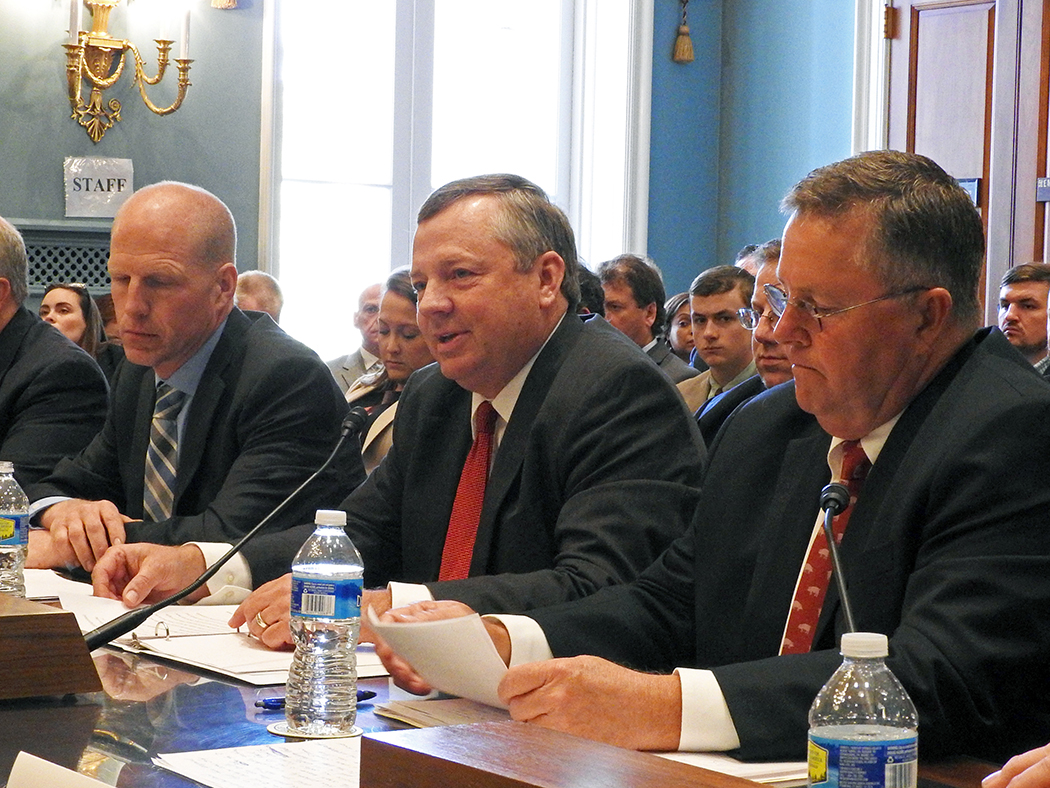NMPF Chairman to House Subcommittee: Dairy Farmers Face Numerous Challenges
June 5, 2016
 NMPF Chairman Randy Mooney told a congressional committee in late May that the current dairy economic situation is presenting real challenges for dairy farmers, and urged Congress to work with NMPF to strengthen the Margin Protection Program, pass federal labeling preemption legislation for foods produced with biotechnology, and pursue market-access opportunities through balanced trade agreements.
NMPF Chairman Randy Mooney told a congressional committee in late May that the current dairy economic situation is presenting real challenges for dairy farmers, and urged Congress to work with NMPF to strengthen the Margin Protection Program, pass federal labeling preemption legislation for foods produced with biotechnology, and pursue market-access opportunities through balanced trade agreements.
Mooney, a dairy farmer from Rogersville, Missouri, and also chairman of Dairy Farmers of America, joined members of the turkey, pork and beef sectors at the hearing on the state of the livestock sectors.
In his testimony before the House Agriculture Subcommittee on Livestock and Foreign Agriculture on May 24, Mooney said he believes that the Margin Protection Program is the right program for dairy’s future, but asked Congress to work with NMPF to explore further adjustments that would improve the program’s effectiveness.
“The program is not completely fulfilling its intended objective as an effective safety net,” said Mooney. “For many farmers, the MPP is simply not enough to protect them in this economic environment.”
The dairy industry is experiencing a global downturn in milk prices, in part because of large milk production increases in the European Union following the elimination of production quotas there in April 2015. The Margin Protection Program (MPP) was developed following the recession-induced dairy price crash seven years ago. The program offers dairy farmers the ability to purchase insurance-type coverage against poor margins in their income over feed costs.
Administrative changes that have been made to the program by USDA will enhance the MPP’s flexibility and make it more useful for farmers, Mooney said, but added that further steps by the Congress may be needed to “improve the effectiveness of MPP for all dairy producers.”
In his testimony, Mooney also urged Congress to quickly establish a national law prescribing disclosure provisions for foods made with genetically modified ingredients. A Vermont law requiring labels on many foods made with biotechnology is slated to take effect on July 1st. In the absence of clear federal standards more states will likely pass their own mandates, leading to a confusing series of label requirements across the entire food marketing chain, he said.
“Failure by Congress to address this issue threatens the viability of not only my farm, but also the 30,000 farmers I represent. It also threatens our ability to feed the world’s growing population,” he said.
Addressing the topic of the Trans-Pacific Partnership Agreement, Mooney said that it is imperative that each participating country be held to its commitments, and that outstanding implementation and enforcement issues be addressed as Congress prepares to consider the pact.
Mooney also expressed concern about the Trans-Atlantic Trade and Investment Partnership (TTIP) currently being negotiated with the European Union (EU). Specifically, Mooney noted the EU’s lack of commitment to opening its markets to agricultural trade, and its repeated attempts to establish new non-tariff trade barriers through the use of geographical indicators and other protectionist measures.
“The EU has not demonstrated a good-faith commitment to open agricultural trade,” said Mooney. “The U.S. must proceed cautiously by securing clear commitments from the EU to guard against the imposition of future trade barriers.”






